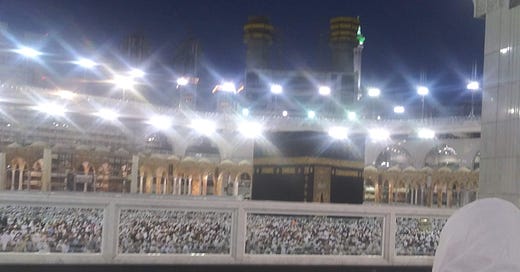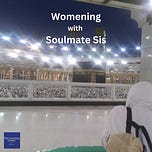Everyone has experienced the pain of wanting something that seems incredibly distant, if not outright impossible.
In Sara’s case it was a child.
Imagine you are a blessed woman with a spouse who had a literal prophecy you would bear one. A blessed one. Yet years go by, with no child in sight.
Not just years, but decades. In the meantime, he begins loving a slave alongside you.
While Sara may seem like a basic, common name, her name means princess and that’s the beauty of it. While she was literally from royalty and recognized in Islam, Judaism, and Christianity alike as a pious woman, she was also the average woman, underrated and highly favored.
In rare cases when Prophet Abrahim is not centered, Hajr, the first single mom is usually highlighted in readings of prophetic tradition. Yet there would be no Muhammad without his righteous ancestors, the proceeding prophets and messengers, and their mother, Hajr, and there would be no Hajr without Sara.
It was Sara that asked for a maidservant to help with their infertility, known as Hajr. When Sara was treated by doctors, she made sure her servant was seen as well. Whether it was through shared princess treatment by Sara, Ibrahim, or a combination thereof, Sara started to take fault with her servant and fellow Nubian’s manner, uncharacteristic of a slave.
Like the Quran, we won't get into details, but suffice it to say most Islamic school curriculum neglects to mention Sara, let alone praise her. If Sara is mentioned, it’s with undertones of being the jealous villain, with Hajr and Ismail as sacrificial lambs, pedestalizing what one too many misconstrue as outright abuse (we seek refuge in Allah from this).
To the contrary accepted and made peace with what she did not understand, evident in her laughing in the face of the angel that brought news of her son Ishaq at 90 years of age.
We must be clear that ultimately these were a chosen family acting in Supreme alignment with the will of Allah. Yet that does not change the problematic tint this can have. Alhamdulillah for the real life mandate to experience the journey of mother and child, father and son the most blessed of family’s.
Tastes like the breaking of a fast in communion or the Ishraq prayer. Familiar with sacrifice, but don’t make a home of it. Like a baby soothed, fast broken, prayer made after being awake all morning. Emphasis on baby soothed- their cries conjure chemicals in the mother especially that make it again, impossible to both ignore and soothe, because they are still subject to the decree of Allah with a will separate from yours. The sweetest things can only be understood through the full experience.
Like paradise, soulmates come in tastes and previews. Paradise made for is not the other way around.
Circling Back to Soulmates
While we know the time,[1] there is a difference of opinion on the places of our Father Adam and Mother Hawa’s descent to earth. Some[2] said Adam went to Dihna, between Mecca and Ta’if. Others[3] said Adam went to India, while Hawa went to Jeddah, where they reunited, forgiven, on the plane of Arafat. Still, others[4] pinpoint Sayidina Adam’s landing point as The Black Stone on the Ka’ba or As Safa while Sayyiditunna Hawa’s al Marwa[5]- the same hills Lady Hajr, wife of Abrahim ran searching between.
The root letters for Abra (Abrahim) and Sar (Sara) end with an exhale. A long, happy ending, if you will. Their names are the same in Arabic and Hebrew.
The struggle of Siyyiditunna Hajr a Nubian, and Sayyidina Abrahim, a Persian, mirrors the love lost and destined to be found. Their hearts tested deeper than many of us can imagine. As she hurried after him in the desert valley carrying their newborn son she asked, “Where are you going Abrahim, leaving us in this valley where there is no person whose company we may enjoy, nor is there anything to enjoy?” She repeated the question to his silence[6], several times until it dawned on her: “Did Allah command you to do this?”
He replied “Yes.”
“We won’t be lost, since Allah Who has commanded you is with us,” was her response.[7] Allah makes our affair of love clear, with a prayer from the departing husband:
“O our Lord! I have made some of my offspring dwell in a valley without cultivation, by Your Sacred House (Ka’ba at Mecca) in order, O our Lord, that they may offer prayer perfectly. So fill some hearts among men with love towards them, and O Allah provide them with fruits so that they may give thanks” (Quran, Ibrahim 14:37).
Reunion
It was history from there. Every year, people of various backgrounds unite at one time and the city, founded by her, to commemorate what was to proceed. In desperation to feed her child after several days, she ran between Safa and al Marwa, hoping someone, anyone, might come in a time of distress. On her 7th run to al-Marwa, she saw water at the kicking feet of baby Ismail.[8] Eventually, the water attracted birds, then a tribe. To Hagar’s delight, they settled in. Ismail learned through them and eventually married into their clan. In a rare account of Abrahim’s reunion with Ismail, after his mother’s death, he advises Ismail’s wife:
“‘When your husband comes, give my regards to him and tell him that he should keep firm the threshold of his gate.’
When Ishmael came back he asked his wife, ‘Did anyone call you?’
She replied: ‘Yes, a good-looking old man came to me,’ so she praised him and added: ‘He asked about you and I informed him that we were in a good condition.’
Ishmael asked her:’ Did he give you any piece of advice?’
She said; ‘yes, he told me to give his regards to you and ordered that you should keep firm the threshold of your gate.’
On that, Ishmael said: ‘It was my father, and you are the threshold of the gate. He has ordered me to keep you with me.’”[9]
Most of us know the story unfolds to more harsh trials for each, yet end with ease. Rather than sacrifice a beloved a second time, Allah shows loving mercy in sending a substitute. Allah’s very own Sacred House is built at the heart of the city of so much heartbreak. A house billions around the world only aspire to receive the invitation to visit before the celebration, Eid al Adha.
Soulmates and The Plane of Arafah
One rite stands out as the cornerstone of not only Hajj but our beginnings and end. The Prophet ﷺ said: “The Hajj is Arafah”[10]. What is it that makes praying and asking forgiveness at Arafah the last official ritual of the final pillar of Islam? The initial Arafat (meaning “to know intimately”), is significant in that The Day of Alast is said to have been there.[11] On a metahistorical moment cited as The Day of Alast,[12] it is said “When your Loving-Sustainer took from the children of Adam — from their loins — their descendants and made them testify of themselves, [saying to them], ‘Am I not your Loving-Sustainer?’ They said, ‘Yes, we have testified.’ [This] — lest you say on the day of Resurrection, ‘Indeed, we were of this unaware’” (Quran, The Heights 7:172).
This is cited with The Prophetic Tradition translating to: “The souls are (like) aligned soldiers joined (in the world of spirits) whichever souls knew each other (in that world) attract each other (in this world)”[13] to substantiate the levels of affinity people experience for one another in this world. Moreover, this is the premise for the ever-present knowledge of a higher being, and thus the fitra, or natural dispositions of humans toward The Highest Unity, God. In our case, specifically, this inclination manifests in the yearning for union and procreation. Further, it is how we are gathered on the last day[14] as the Quran says: “They will be raised as we created them the first time…” (Quran, The Cave 18:48) following a verse about gathering on a plane The Last Day.
To Know God is to Love
Whether knowing proceeds to loving or vice versa is the topic of another discussion. The pinnacle of Hajj (and life) remains reaching the plane of Arafah to ask for redemption as our righteous ancestors did. It is no coincidence that physical intimacy is prohibited during this event. Allah wants us to know a love including but not limited to that. As it was revealed in our Prophet’s ﷺ last sermon on that same plane “…This day have I perfected your Din for you, completed My Grace upon you, and have chosen Islam for you as your Din[15]…” (Quran, The Table Spread 5:3). To know the love of Allah is the completion of our decree.
References
1. “The best day on which the sun has risen is Friday. One this day Adam was created, and on this day he was descended to earth” (al Bukhari).
2. Ibn Abbas, Qisas an Nabiyeen translation, Ibn Kathir.
3. al-Hassan, Ibid.
4. Ass’ady, Ibid.
5. Ibn Umar, Ibid.
6. Ibn Abbas reports she asked “Whom are you leaving us to?” To which he responded “Allah’s care.” Ibid.
7. Ibn Abbas, Ibid.
8. Ibn Kathir specifies Muhammad’s ss narration as through and angels digging with a wing or heel.
9. Ibid.
10. Reported in most major hadith works.
11. Imam al-Haddad mentions in his work The Lives of Man.
12. I skip pronouncing the vowel (“Alastoo”) because of its uncanny cognate with the English “at last” more so than it being the end of the phrase.
13. Sahih al-Bukhaari, Kitaab Ahaadeeth al-Anbiyaa’.
14. There is a difference of opinion as to the exact location due to narrations such as Abu Dharr’s.
15. Commonly translated religion, or faith, specifically breaks down to disposition, Debtor indebtedness, and the essence of civilization, or madina. See the-concept-of-religion-by-sayyid-naquib-al-attas for an in-depth discussion of this.













Share this post